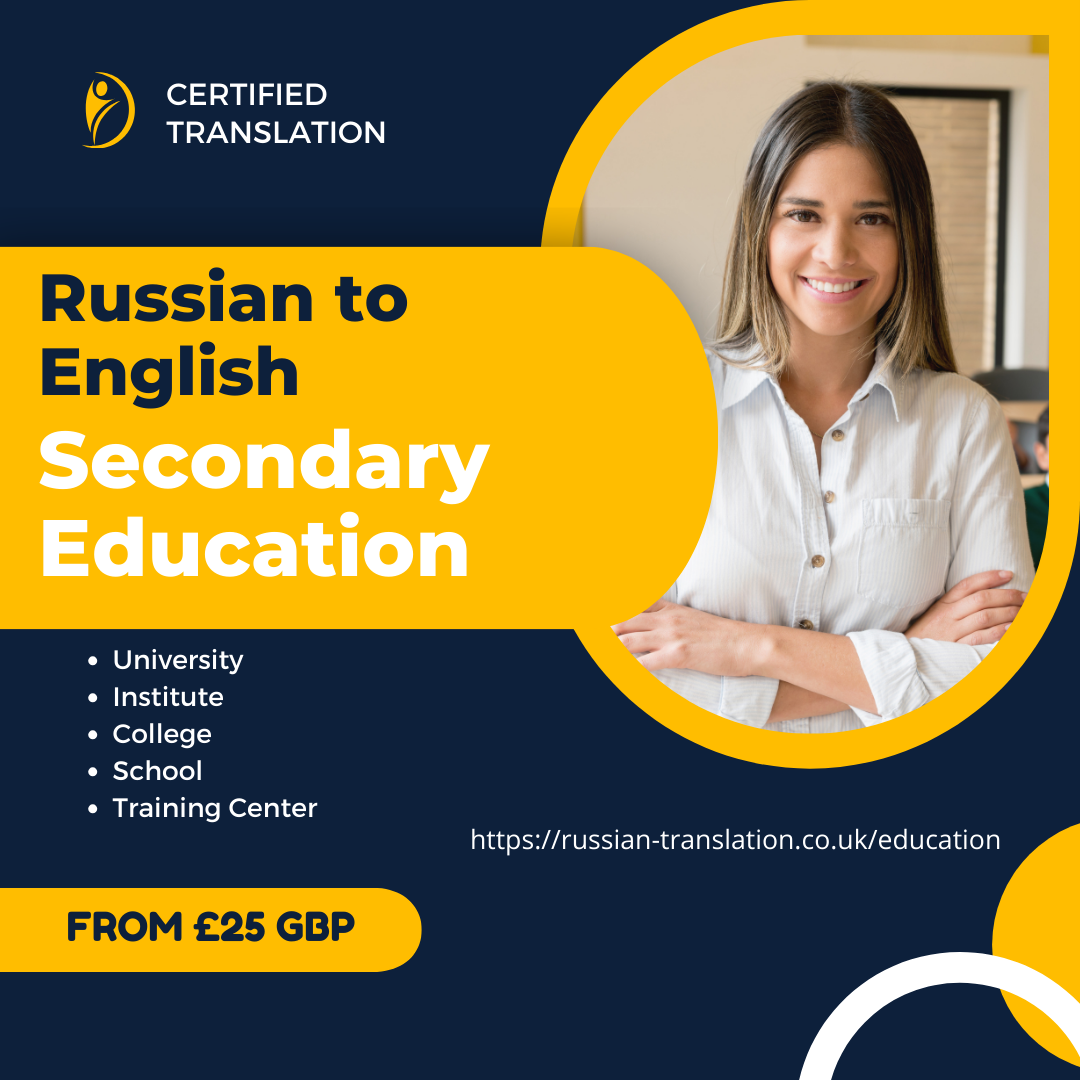Russian to English Certified Translation of Secondary Education Documents in the UK
In today’s globalised world, the need for accurate and certified translations of educational documents has become increasingly important. This is particularly true in the United Kingdom, where individuals from diverse backgrounds seek to further their education, pursue employment opportunities, or apply for immigration. Among the many languages requiring translation services, Russian is one of the most prominent, given the significant number of Russian-speaking individuals residing in the UK and those seeking to relocate here. This article delves into the specifics of Russian to English certified translation of secondary education documents in the UK, exploring who may need this service, why it is necessary, and which institutions or agencies typically require such translations.
Russian translation services in the UK
Russian to English translation of secondary education documents in the UK
Russian to English certified translation of documents for secondary education in the UK
Russian translation of documents in the UK
Russian to English translation of legal documents in the UK
Russian to English translation of financial documents in the UK
Russian to English translation of medical documents in the UK
Russian to English translation services in the UK
Russian to English translation of documents in the UK
Russian translation services in the UK
Russian to English translation of secondary education documents in the UK
Russian to English certified translation of documents for secondary education in the UK
Russian translation of documents in the UK
Russian to English translation of legal documents in the UK
Russian to English translation of financial documents in the UK
Russian to English translation of medical documents in the UK
Russian to English translation services in the UK
Russian to English translation of documents in the UK

Who May Need the Russian to English Certified Translation of Secondary Education Documents in the UK?
- International Students:
- Prospective University Applicants: Many Russian-speaking students aspire to study at UK universities. To apply for undergraduate or postgraduate programs, they must submit their secondary education documents (e.g., school transcripts, diplomas, and certificates) in English. A certified translation ensures that the documents are accurately understood by the admissions committees.
- Language Schools and Colleges: Students attending language schools or colleges in the UK may also require certified translations of their secondary education documents to demonstrate their academic qualifications.
- Immigrants and Refugees:
- Immigration Applications: Individuals seeking to immigrate to the UK, including those under the Skilled Worker Visa, Family Visa, or other immigration routes, often need to provide proof of their educational qualifications. Certified translations of secondary education documents are essential for these applications.
- Refugee Status Applications: Refugees and asylum seekers may need to translate their educational documents to support their claims for protection and to access educational or employment opportunities in the UK.
- Job Seekers:
- Employment in the UK: Russian-speaking professionals seeking employment in the UK may need to provide certified translations of their secondary education documents to meet the requirements of potential employers or regulatory bodies.
- Professional Registration: Certain professions, such as healthcare, teaching, and engineering, require registration with UK regulatory bodies. These bodies often demand certified translations of educational documents as part of the registration process.
- Returning Residents:
- Returning to the UK: Individuals who have spent time studying or living abroad and are returning to the UK may need to provide certified translations of their foreign educational documents to re-establish their academic or professional credentials.

Why and What for People Need the Russian to English Certified Translation of Secondary Education Documents in the UK
- Accurate Representation of Academic Qualifications:
- The primary reason for certified translations is to ensure that the academic qualifications of Russian-speaking individuals are accurately represented in English. This is crucial for institutions and employers to understand the full extent of the applicant’s educational background.
- Compliance with Legal and Regulatory Requirements:
- Many UK institutions, agencies, and employers have legal or regulatory requirements that mandate the submission of documents in English. Certified translations help individuals comply with these requirements, avoiding potential delays or rejections of their applications.
- Verification and Authentication:
- Certified translations are often required to verify and authenticate the authenticity of the original documents. This is particularly important for immigration, university admissions, and professional registration processes, where the credibility of the documents is paramount.
- Access to Educational and Employment Opportunities:
- Without certified translations, individuals may face barriers in accessing educational or employment opportunities in the UK. Accurate translations enable them to present their qualifications effectively and compete on an equal footing with native English speakers.

What Offices, Departments, Agencies, Institutes, Colleges, or Universities May Require the Russian to English Certified Translation of Secondary Education Documents in the UK
- Universities and Colleges:
- Admissions Offices: UK universities and colleges often require certified translations of secondary education documents from international applicants. This includes school transcripts, diplomas, and certificates.
- Language Schools: Language schools that cater to international students may also require certified translations of educational documents to assess the student’s academic background.
- Immigration and Visa Agencies:
- UK Visas and Immigration (UKVI): The UKVI requires certified translations of educational documents for various visa applications, including student visas, work visas, and family visas.
- Home Office: The Home Office may require certified translations of educational documents for asylum and refugee status applications.
- Professional Regulatory Bodies:
- General Medical Council (GMC): Medical professionals from Russia seeking registration with the GMC must provide certified translations of their educational documents.
- Nursing and Midwifery Council (NMC): Similarly, nurses and midwives from Russia must submit certified translations of their educational qualifications to register with the NMC.
- Engineering Council: Engineers from Russia seeking professional registration in the UK must provide certified translations of their educational documents.
- Employers and Recruitment Agencies:
- Multinational Companies: Employers in multinational companies may require certified translations of educational documents from Russian-speaking job applicants to verify their qualifications.
- Recruitment Agencies: Recruitment agencies that specialise in placing international candidates may also require certified translations of educational documents as part of the vetting process.
- Local Authorities and Educational Institutions:
- Local Education Authorities (LEAs): LEAs may require certified translations of educational documents for children of Russian-speaking families seeking admission to UK schools.
- Further Education Colleges: Further education colleges that offer vocational training programs may require certified translations of secondary education documents from international students.
Who is Authorised to Translate Secondary Education Documents from Russian to English in the UK
- Certified Translators:
- Members of Professional Translation Organisations: Translators who are members of professional organisations such as the Chartered Institute of Linguists (CIOL) or the Institute of Translation and Interpreting (ITI) are often authorised to provide certified translations. These organisations have rigorous membership criteria, ensuring that their members are qualified and experienced.
- Sworn Translators: In some cases, translators who have been sworn in by a court or other legal authority may be authorised to provide certified translations. However, this is less common in the UK compared to other countries.
- Translation Agencies:
- Accredited Translation Agencies: Translation agencies that are accredited by recognised bodies such as the Association of Translation Companies (ATC) or the National Register of Public Service Interpreters (NRPSI) can provide certified translations. These agencies employ qualified translators and have established processes for ensuring the accuracy and certification of translations.
- Legal Professionals:
- Solicitors and Notaries Public: In some cases, solicitors or notaries public may be authorised to provide certified translations of documents. However, this is typically done in conjunction with a professional translator who has prepared the translation.
The demand for Russian to English certified translation of secondary education documents in the UK is driven by the need for accurate representation of academic qualifications, compliance with legal and regulatory requirements, and access to educational and employment opportunities. Individuals from diverse backgrounds, including international students, immigrants, job seekers, and returning residents, may require this service. Institutions such as universities, immigration agencies, professional regulatory bodies, employers, and local authorities often mandate certified translations as part of their application processes. Authorised translators, members of professional translation organisations, accredited translation agencies, and, in some cases, legal professionals, are qualified to provide these certified translations. Ensuring the accuracy and certification of translations is crucial for individuals seeking to establish their academic and professional credentials in the UK.
Featured articles:
Russian translation of higher education documents in the UK
Russian to English translation of Divorce Certificate in the UK
Russian translation of engineering documents in the UK
Russian to English translation of medical report in the UK
Russian to English translation of Name Change Certificate in the UK
Russian to English translation of Divorce Certificate in the UK
Russian translation of engineering documents in the UK
Russian to English translation of medical report in the UK
Russian to English translation of Name Change Certificate in the UK













